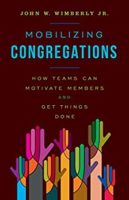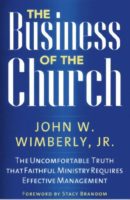
We live in a culture that trains us to think of problems as “our problems.” As pastors, too often, we think that we must figure out how to grow the church, make sure the budget is balanced, and ensure that programs are well attended. I certainly did. Many of my colleagues feel the same way. It is a heavy burden to bear.
The idea that the fate of a congregation is “my problem” mirrors perfectly the individualistic culture of the United States. The myth of the rugged individual is alive and well in congregational life. And yet, organizations ranging from manufacturing companies to the U.S. military to high-performing nonprofits have learned that teamwork is a key to high productivity and effectiveness. One of the quickest ways to transform a lethargic organization into a vibrant one is to build strong teams. Using teamwork, “we” solve the problem, not “I.”
Teams create success
The creation of healthy, faithful congregations is almost always the result of a team effort. Whether it be a staff team working with committed congregation members or a creative lay leadership team creating congregational health, success in ministry (however success is defined) is rarely the result of a single person’s vision and work. Accomplishing God’s purpose for a congregation flows out of teamwork.
When I teach about teams, I face very skeptical audiences. My listeners are thinking—and sometimes saying—“We have a staff team, but it isn’t very productive.” Indeed, every congregation I know claims to have a staff team. But does it have a staff team—or just a staff?
What would a staff team look like? Here are some key characteristics:
- Every staff member understands the purpose of the congregation’s ministry and works toward that end. Success in ministry “silos” has a lower value than the success of the overall ministry. Too often congregations take pride in a great music program, outstanding preaching, or a well-attended youth ministry. Too rarely will the same congregation have an overall ministry about which it can be proud. A part of the ministry overshadows the whole. When a staff functions as a team, the health and success of the entire ministry comes first. Everyone on the team feels responsible for the whole, celebrates the success of the whole, and works to solve problems that undermine wholeness.
- Every staff member has a clearly defined role in achieving the congregation’s and team’s stated purpose. As members of a staff team, when we understand exactly what we are supposed to do to benefit the overall ministry, we are far more likely to do it. We also gain deep satisfaction as we do it.
- Teams require specific skill sets to accomplish their purpose. Hiring people based on needed skills is not always present in congregations. Too often, we settle for what is available, not specifically what we need. Within a staff, we can’t move a person from one responsibility to another unless the person has demonstrated the well-defined skills required for the new job. We are better off hiring no one than employing someone who lacks the requisite skill set.
- Each person understands how his or her individual work contributes to the whole. In a church staff team, the janitor, administrative assistant, treasurer, nursery workers, program staffers, and pastors must all understand clearly how their work helps the congregation achieve its purpose.
To foster all of these essential characteristics and make them effective, teams need effective leaders. In many teams, a strong team leader is required—but leadership roles evolve as the team does its work. Typically, a congregational staff team leader is the senior or lead pastor. However, team leadership is not the sole responsibility of the team leader. Leadership roles change as the work progresses.
Team leadership evolves
For example, in an urban hospital emergency room, in the first encounter with the patient, the leadership may come from a security guard who makes sure the patient is not a danger to the staff or to him or herself. Once security is assured, the leadership changes to the nursing staff who do preliminary work with the patient. At that point, the physician becomes the team leader. When the physician is finished, the leadership returns to the nursing staff. It isn’t hard to imagine how leadership might change on a congregational staff as the workload changes during the implementation of a strategy.
Very few of the “staff teams” with which I work or of which I have been a part exhibit all or even most of these characteristics. They use the language of teams but do not display the most essential characteristics of a team. The staff “team” remains hierarchical. The ministry of the congregation continues to be divided into silos. Even relatively small congregations exhibit the silo style of operation.
Becoming a staff team
Evolving from a staff called a team to a staff working as a team will not come without a lot of intentionality and some conflict. Staffs need to have frank conversations about whether they are willing to operate as a team. I have heard many staff members categorically reject the idea that any other staff member has a say in their silo. I appreciate their honesty. I also know the limitations that attitude places on the success of the overall ministry. Sometimes, in order to create a staff team, one or more non-team-playing staff members have to leave.
Crucially, a staff team can’t exist unless the lead pastor is willing to be a member (as well as leader) of the team. Is the pastor willing to share power? Is she able to create a team culture in which anything and everything can be constructively criticized? If not, the lead pastor will prevent the staff from growing into a team.
I refuse to undervalue strong, creative, faithful leadership from pastors. As I have watched particular congregations grow and decline in membership, one of the primary variables has been pastoral leadership. Outstanding pastoral leadership led to growth. Less stellar leadership created a time of decline. Pastoral leadership matters in ways we rarely want to acknowledge explicitly.
That being said, one of the keys to pastoral leadership today is moving from a “it is my problem to solve” mindset to a “it is our team’s opportunity to solve this problem.” The best way for a senior or lead pastor to succeed is for the staff team to succeed. The more we learn about high-productivity teams, the more we can increase probability that congregations will achieve their stated purpose.
John Wimberly is an experienced pastor and consultant. As a consultant, he has worked with congregations and judicatories on strategic planning, staff designs for the 21st century, and congregational growth as well as financial and administrative management. He has MBA, MDiv, and PhD (theology) degrees. His books focus on effective management and leadership. John believes congregations can have a bright future!



